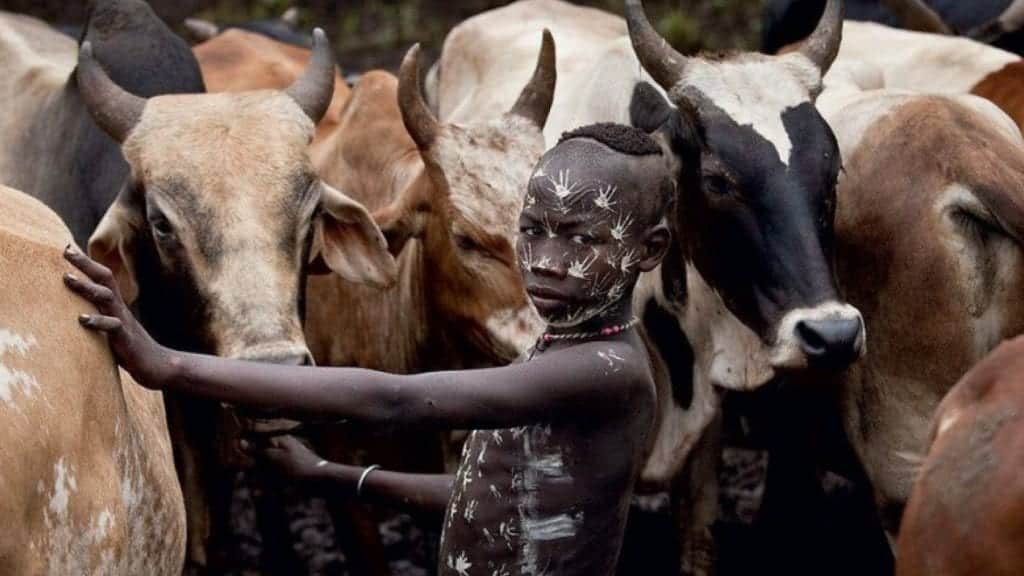This once in a lifetime trip is a rare chance to meet the Hidden Tribes of Ethiopia and Kenya; people who have walked along the same mystical paths for centuries and whose lives are shrouded in ancient culture and secrecy.
– In Ethiopia, we will discover Emperors and Archangels, a New Jerusalem, and the 3.5 million years old bones of Lucy. Visit music houses while you sip on tej. Meet tribes who are almost totally isolated from outside influences and see them paint their bodies, braid their hair and adorn themselves with ochre and lip plates. Speak to the crocodile hunters and experience their coming of age ceremonies.
– Time in Kenya will give us the incredible opportunity to visit the secret Singing Wells (absolutely no photography is allowed) and the Reteti Elephant Orphanage of the most remote Samburu.
– There will be game viewing, as the homes of these tribes are both very remote and very wild. But this is no ordinary African safari.
Highlights
- Experience the Samburu Singing Wells
- Get up close to elephants at Reteti Sanctuary
- See a DIMI ceremony among the renowned crocodile hunters- the Dassanech
- Dance with the Kara people
- Visit the Mursi people, the most recognized of the Omo tribes, with their lip and ear plates
- Take an Ethiopian cooking class
- Visit Lalibela

Itinerary
DAY 1
City Tour & Welcome Dinner Addis Ababa
Welcome to Ethiopia! On arrival at Addis Ababa Bole International Airport, clearing customs and transfer to The Sheraton, located in the heart of the Ethiopian capital. You have the morning to relax and rejuvenate, the hotel has a wide range of facilities including pools, restaurants and the Aqva Club which offers a variety of massages.
After lunch, we will begin the city tour. We first drive north up to Mount Entoto. In 1881 Emperor Menelik II made his permanent camp there, after remains of an old town were discovered, which Menelik took as a divine and auspicious sign. From the top, there is a panoramic view of the capital and surrounding countryside. Entoto is an important watershed; to the north, water flows to the Blue Nile and on to the Mediterranean, to the south to the Awash River and east to Djibouti. Your guide will point out the important landmarks of the city.
Entoto was soon abandoned as a site for the capital – it was cold, difficult to provision and there was a shortage of wood. Empress Taytu was said to have led the move down to the plain of Finfine in 1889, and to have named the new capital Addis Ababa, or New Flower. However, two important structures remain within the old imperial compound on Entoto, the churches of Mariam and the Archangel Raguel. These two churches house important artifacts from various historic periods and are significant architecturally as well.
Leaving the churches, we descend to Addis Ababa, stopping off at the National Archaeological Museum. You can view exhibits ranging from the 3.5 million-year-old bones of Lucy, from the Axumite and Gondarene periods through to the period of the monarchs Tewodros and Menelik II.
You will return to the hotel for dinner and overnight stay.
DAY 2
Traditional music houses of Lalibela & Ethiopian Cooking Class
After an early breakfast, road transfer to the airport for your charter flight to Lalibela. On arrival at the airstrip, you will be transferred to Mezena Lodge. Shortly after, we will start our tour of the churches followed by lunch and continuing in the afternoon. Please note: churches are closed from 1200-1400.
Spanning the late 12th and early 13th centuries, King Lalibela of the Zaghwe dynasty built a series of rock-hewn churches – the New Jerusalem as he called it. These structures are now rightly acknowledged to be one of the wonders of the world. There are 11 churches in the town named after him, with others in the surrounding countryside. All are still in use today. (The churches are divided into two groups, the division being the River Jordan. It is estimated that the churches took 25 years to construct in the wealthy kingdom. The area then was clearly fertile and agriculturally productive, whereas now deforestation and population pressures on the land have reduced its productivity.
We will visit a typical farm, where we will be guided on the issues relating to farm work and the daily life of people engaged in agriculture. This interaction benefits the farmer and his family. Then, enjoy a cookery class in Ethiopian cuisine. Finally, there are vibrant traditional music houses in Lalibela, with musicians and singers playing without amplifiers or microphones. Sample honey wine, or tej, and enjoy the dancing!
DAY 3
Churches of Lalibela
In the morning, we set off on mule or on foot to the church of Ashetun Mariam, about four hours’ round trip. We pass small villages on the way up and there are wonderful views of the surrounding countryside from the top of the mountain where the church is located.
If you do not feel up for a hike or mule ride, there is an option of a shorter drive to the cave church of Na’akuto La’ab.
Enjoy lunch, then set off by car to the cave church of Yemrehanna Kristos, built by the king of the same name before the reign of King Lalibela. The church is constructed inside a cave, in Axumite style, similar to the 7th-century monastery at Debre Damo in Tigray, with alternating levels of wood and stone.
DAY 4
Body Painting Ceremony – Omo Valley
After breakfast, you will be transferred to the airstrip for your charter flight to Murile (1 hour 30 mins), by the Omo River, followed by a boat transfer to Lale’s Camp. This evening, you will be among the Kara villagers and you will be attending one of their body painting ceremonies in the village of Dus. Return to Lale’s Camp for your overnight stay.
DAY 5
Isolated Hamar Homesteads, remote villages of the Mursi
Rise early for a morning drive to a Hamar village; where you will interact with the Hamar villagers as they prepare themselves for their day ahead. The Hamar are pastoralists and the women beautify themselves with amazing braided hairstyles covered in red ochre and butter. The use of skins and beads is prevalent in clothing choice. Return to Lale’s Camp for brunch.
On an afternoon boat excursion up the river, we reach the southern extremities of the Mursi areas. Here, we expect to encounter remote villagers coming down to the river during the day. Their villages are up in the nearby mountains and remain relatively cut-off from outside influences. The Mursi are the most renowned of the Omo tribes, with their lip and ear plates. We will enjoy a packed lunch on our boat excursion.
This evening, cruise the river with a good chances of viewing wildlife including hippo, crocodile, waterbuck, monkeys and more! Your overnight is at the Mursi Fly Camp on the river’s edge, where you will be accommodated in a small dome-shaped tent. Each tent has a separate shower and a long drop toilet. Enjoy dinner and a campfire before retiring for the night.
DAY 6
Morning walk/Game viewing & evening fire dance
This morning, before having breakfast enjoy a relaxed walk upriver looking for any signs of wildlife from the previous night, in search of lion, leopard, and antelope. You will then return to Lale’s camp and participate in an evening dance with the Kara, with cold drinks and relaxation around the fire.
DAY 7
Lake Turkana & crocodile hunters of the Omo Delta
This morning we will drive across the grassy plains of Murulle down to the Omo Delta. This region is home of the Dassanech, renowned crocodile hunters from the Omo Delta. Spend the evening on a cruise into the delta which touches the headwaters of Lake Turkana. There are many Dassanech settlements dotted along the river bank and we will mingle with villagers. It may also be possible to see the DIMI ceremonies, a rite of passage for young people in the tribe.
Overnight stay at Delta Fly Camp in a large A-frame safari tent with en-suite flush toilet and shower.
DAY 8
Namunyak Wildlife Conservancy
This morning we will return to the town of Omerate for your charter flight to Addis Ababa. There you will connect with your scheduled flight to Nairobi, Kenya.
Upon landing at JKIA in Nairobi and clearing immigration, you will be met for your private charter to the Namunyak Wildlife Conservancy, Sarara Camp. Accommodations are in a spacious luxury tent with an indoor toilet and an outdoor bathroom. Enjoy magnificent views of the Mathews Mountain Range and animal watering hole.
DAY 9
Orphaned Elephant Sanctuary
Today you will visit the Reteti Elephant Sanctuary, the first community-owned elephant facility in Africa where orphaned and abandoned elephant calves are rescued and released. This initiative creates opportunities for the local community and specifically empowers young Samburu women.
DAY 10
Sacred Singing Wells
This morning, you will experience one of the most sacred cultural experiences in Kenya; the Singing Wells. Drive a short distance to the dry river bed. Permanent wells are maintained by families and passed down from generation to generation. This water gives life to cattle and goats on which these local communities survive. You’ll witness the men and boys singing to their herds, who know each unique song and only drink when called for. (This activity is dependent on dry weather. No photography is permitted.)
DAY 11
Depart Kenya
After your morning meal, you will depart by a private charter to Nairobi, where your amazing cultural experience will come to an end.
